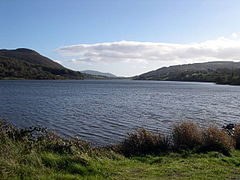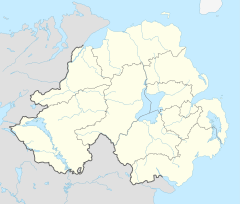Camlough
Camlough
|
|
|---|---|
 The 'crooked lake' from which Camlough derives its name |
|
| Camlough shown within Northern Ireland | |
| Population | 1,081 (2011) |
| District | |
| County | |
| Country | Northern Ireland |
| Sovereign state | United Kingdom |
| Post town | NEWRY |
| Postcode district | BT35 |
| Dialling code | 028, +44 28 |
| EU Parliament | Northern Ireland |
| UK Parliament | |
| NI Assembly | |
Camlough or Camloch (/kæmˈlɒx/ kam-LOKH; from Irish: Camloch, meaning "crooked lake") is a small village in County Armagh, Northern Ireland. The village of Camlough ('Crooked Lake') is so called from the shape of the lake, known as Cam Lough, in the parish, which is about 90 acres in extent. It is located five kilometres west of Newry. Land to the south-east of Camlough rises steeply to Camlough Mountain within the Ring of Gullion.
There is much evidence of pre-Christian settlers in and around the village: the erection of Dolmens on Camlough Mountain, The Hag's Chair in Lislea and the Ballykeel Dolmen which all point towards Stone Age dwellers.
Camlough (Irish: Camloch) was an ecclesiastical district in the Barony of Upper Orior and was anciently part of the O'Hanlon's country. At the time of the Plantation of Ulster, 1000 acres of 12 townlands were granted to Henry McShane O'Neill and the village was developed during this period.
Camlough village is in the townland of Cross, referring not to a stone monument but to the village crossroads in the north of the townland. In 1620 Camlough Mountain was known as Sliabh na Croise, meaning 'Mountain of the Cross'.
Camlough National School
Camlough National School was built in 1836 and was located on the Quarter Road. It was divided into a boys' school and a girls' school. The classroom was heated by a pot-bellied stove in the centre of the room and pupils would have been sent to collect sticks for the fire.
Mass Rock
A Mass Rock (Carraig an Aifrinn), dating from the Penal era, is located in Camlough. It is situated in Grant's Rocks and is over 300 years old. In 2003, a special Mass was held at the Mass Rock in memory of the people who suffered during Penal times.
...
Wikipedia

